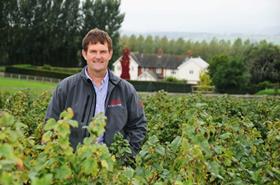
I write this article as we conclude the 2018 UK blackcurrant harvest, which like most crops has been influenced and challenged by the vagaries of the weather.
Vital winter chill was average for the year until the end of February, but then significantly added to during March, which positively delayed bud break by nearly a month, giving excellent pollination and crop potential. However, high yield potential has been reduced to average by the drought. The sunshine has at least produced excellent quality high-brix berries for our customer Ribena, which takes 90 per cent of the UK crop.
Look out for Channel 4’s Food Unwrapped programme on blackcurrants, which will be broadcast in the next couple of months. The show is presented by chef Matt Tebbutt, and was filmed on our farm during the recent harvest.
It has been a most interesting privilege being the president of the International Blackcurrant Association [IBA] for the last two years, starting at the 2016 UK conference in Ashford, Kent, and culminating at the recent conference in Angers, France, the home of crème de cassis.
The June conference was well attended by blackcurrant industry representatives from 16 countries, and as always one of the priorities was to focus on capitalising on the many superfruit health benefits of this little black, mechanically harvested berry.For example, compared with healthy blueberries, the blackcurrant has four times as much vitamin C, and three times as much calcium.
My focus, with full support from the industry following an insightful IBA executive visit to Poland in 2017, was to encourage the world’s largest producer of blackcurrants to significantly change the way the country produced and marketed its fruit, which has been to the detriment of the industry. Poland produces between 100,000 and 150,000 tonnes per year, with 15,000 growers, 50 per cent of whom produce from one or fewer hectares, and treat the production as a cash hobby, with no planned marketing, no payment of plant breeding royalties, contracts, or food safety, traceability and auditing systems.
Contrast this with the well-respected UK industry, where a small group of about 33 geographically spread professional growers produce about 11,000t per year on contract to Lucozade Ribena Suntory for the iconic drink. All growers are audited, provided with agronomic visits, and all the fruit produced is fully traceable. In addition, growers pay a deducted levy, which is used for AHDB R&D and also promotional work.
Our strong message to the Polish industry was that there should be more co-operation and collaboration between growers and processors, who should be encouraged to purchase fruit only from professional growers, with audited traceability.
The message this year seems at last to have got through to Polish processors, who have historically paid virtually nothing for the gardening sector production, but taken it all. This year I have heard through reliable sources that processors are only taking what they require. This is tough on the small hobby grower, and many plantations will be grubbed, but long term this is the right answer for Poland, and the global industry.






No comments yet